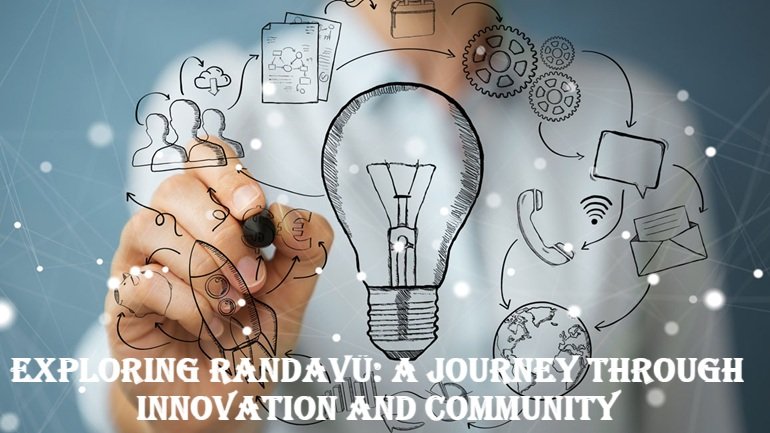Exploring Randavü: A Journey Through Innovation and Community

Randavü is more than just a word; it’s a cultural phenomenon that embodies connection, innovation, and community spirit. Imagine stepping into a space where ideas flourish and relationships deepen. This unique practice has its roots in traditions but adapts effortlessly to modern life. In this post, we will dive deeper into what Randavü means and explore how it shapes our social interactions and business practices today. Whether you’re hosting or attending one, understanding the essence of Randavü can transform your experience completely. Let’s embark on this enlightening journey together!
What Randavü Means and Why It Matters
Randavü encapsulates the spirit of coming together. It’s not just a meeting; it’s an experience that fosters collaboration and connection among individuals. The essence lies in sharing ideas, values, and creating bonds.
In today’s fast-paced world, Randavü serves as a reminder to pause and engage meaningfully with others. This practice encourages open dialogue, sparking innovation within communities and workplaces alike.
Moreover, Randavü highlights the importance of cultural traditions while adapting them for contemporary needs. It bridges generational gaps and unites diverse perspectives under one umbrella of understanding and cooperation.
History and Etymology of Randavü
The term “Randavü” has roots that trace back to ancient practices of gathering. It originates from a blend of languages, reflecting cultural exchanges over centuries. This unique word symbolizes more than just a meeting; it embodies connection.
Historically, Randavüs were informal yet structured gatherings aimed at fostering relationships within communities. These interactions laid the groundwork for social protocols we see today.
As societies evolved, so did the concept of Randavü. Its meaning expanded to include not only personal connections but also business collaborations and creative brainstorming sessions, making it relevant across various fields.
Randavü in Social Life: Etiquette and Expectations
Randavü plays a significant role in social life, serving as a bridge between individuals. It fosters connections and strengthens bonds within communities. Expecting punctuality is crucial; it shows respect for others’ time.
When attending a Randavü, dress appropriately to reflect the occasion’s significance. This consideration speaks volumes about your values and level of engagement. Conversations should flow naturally but remain respectful.
Moreover, engaging actively is essential. Listening attentively demonstrates genuine interest in others’ perspectives. Practicing these etiquettes enhances the experience for everyone involved, creating an atmosphere where relationships can flourish organically.
Randavü in Business: Formal Practices and Expectations
Randavü in business settings emphasizes professionalism and respect. These meetings often serve as platforms for collaboration, decision-making, or networking. Attendees are expected to arrive punctually and prepared.
Formal practices include establishing clear agendas ahead of time. This ensures that discussions remain focused and productive. Participants should also follow up with notes or action items afterward to maintain accountability.
Dress codes can vary based on industry norms but tend toward smart casual or business attire. Maintaining a positive demeanor is crucial, as these interactions help foster relationships essential for long-term success in any professional environment.
Practical Tips for Hosting or Attending a Randavü
When hosting a Randavü, choose a welcoming venue that encourages conversation. A cozy café or quiet park can create the right atmosphere. Make sure to send out invites in advance, allowing guests ample time to prepare.
Dress appropriately based on the occasion and location. Casual attire may work for informal meetings, while business casual is ideal for professional settings.
During the meeting, be present and engaged; listen actively and avoid distractions like phones. Encourage everyone to share their thoughts, ensuring that each voice is heard in your Randavü gathering.
Randavü in the Digital Age: Virtual Meetings and Cultural Continuity
Randavü has evolved significantly in the digital age. Virtual meetings have become a staple, allowing people to connect regardless of geographical boundaries. This transformation retains the essence of Randavü while adapting to modern needs.
Platforms like Zoom and Microsoft Teams facilitate these interactions, making it easier for participants to engage meaningfully. Video calls recreate the social dynamics often seen in face-to-face meetings.
Cultural continuity remains vital as traditions blend with technology. As we navigate this new landscape, it’s essential to uphold etiquette and respect during virtual Randavüs, ensuring that relationships thrive despite physical distance.
Generational Differences in Approaching Randavü
Generational differences significantly shape how people approach Randavü. Older generations often value face-to-face interactions, emphasizing respect and formality during these meetings. They may see Randavü as an essential tradition that fosters trust and long-term relationships.
In contrast, younger generations tend to embrace a more casual attitude toward formal gatherings. They prioritize efficiency and may prefer virtual platforms for quick discussions instead of traditional settings.
This shift reflects broader changes in communication styles, with millennials and Gen Z valuing flexibility over rigidity while still recognizing the importance of connection through Randavü practices.
The Psychology Behind Randavü: Why Scheduled Meetings Matter
Scheduled meetings, like Randavü, tap into our innate need for structure. They create a framework that helps individuals prioritize their time and commitments. This sense of order can significantly reduce anxiety.
Moreover, the anticipation of a meeting fosters emotional investment. People prepare mentally and emotionally when they know what to expect. This preparation enhances engagement during discussions.
Regular gatherings cultivate community ties. They reinforce relationships by creating shared experiences and memories among participants. These social bonds are foundational for collaboration and innovation within any group setting.
Comparing Randavü with Similar Meeting Customs
Randavü shares similarities with customs like the Japanese “enkai” and Italian “aperitivo.” Both emphasize social bonding, often revolving around food and drink. They foster relationships, allowing participants to unwind in a relaxed setting.
Unlike formal meetings, these gatherings prioritize warmth over rigidity. While Randavü may include structured elements, it leans toward a more informal atmosphere that encourages open dialogue and connection.
In contrast to Western business lunches or networking events that can feel transactional, Randavü embraces community spirit. It nurtures genuine interactions rather than mere professional exchanges, making every encounter memorable and meaningful.
How to Plan the Perfect Randavü: A Step-by-Step Guide
Start by defining the purpose of your Randavü. Whether it’s casual or formal, knowing the goal helps shape everything from venue selection to guest list.
Choose a suitable location that fosters comfort and engagement. Consider quiet cafes or cozy meeting rooms where everyone can connect without distractions.
Send out invitations well in advance. Include essential details like time, date, and agenda. Encourage attendees to come prepared with ideas or topics for discussion, creating an atmosphere ripe for collaboration and creativity.
Conclusion
Randavü embodies more than just a meeting; it represents a blend of tradition, innovation, and community. As we navigate an increasingly digital world, the essence of Randavü continues to evolve while maintaining its core values. Whether you’re hosting or attending these gatherings, understanding their significance can enhance your experience. Embracing this practice fosters connections that transcend mere social interactions and encourages collaboration across generations. By appreciating the nuances of Randavü, you can enrich both personal and professional relationships in meaningful ways.





